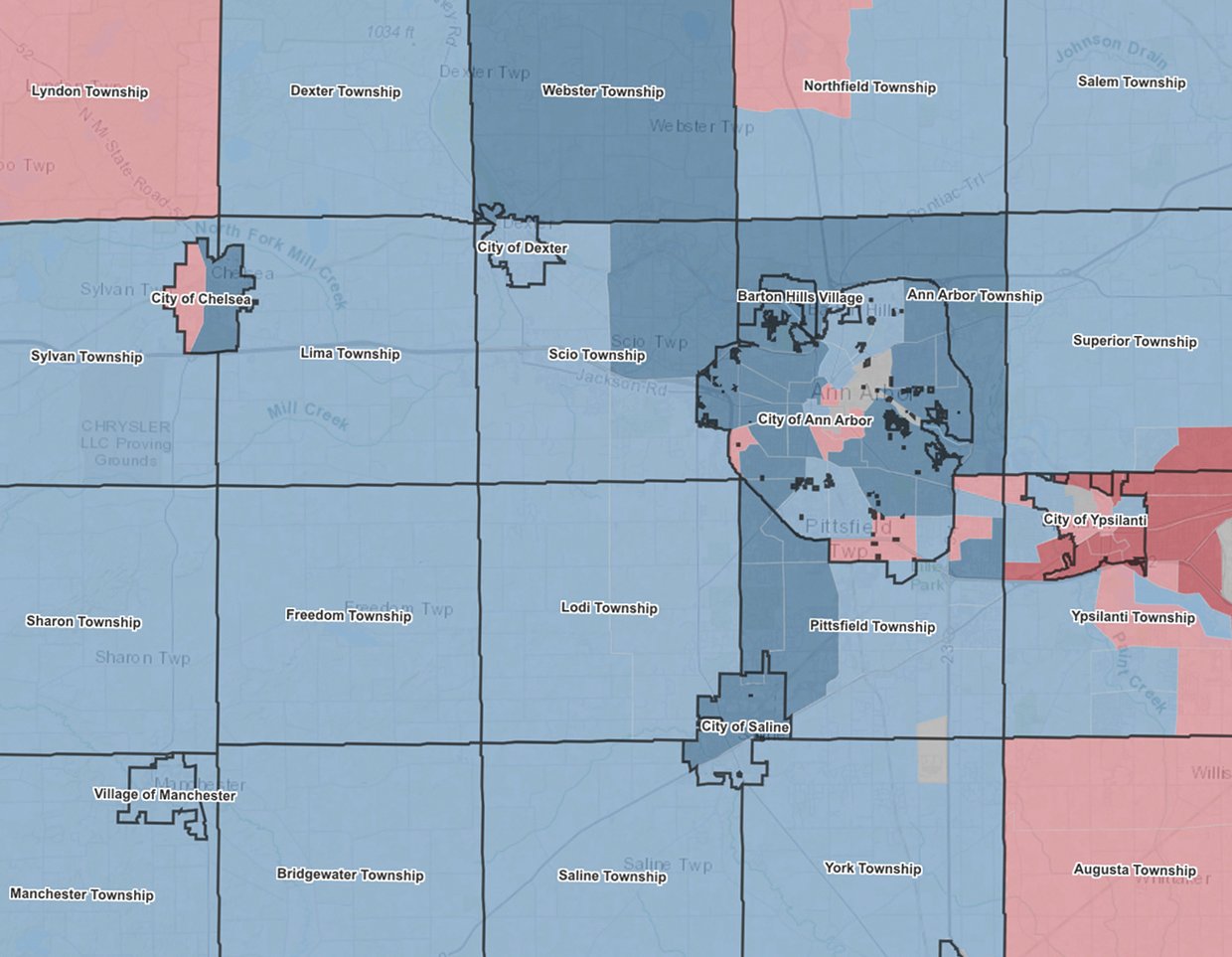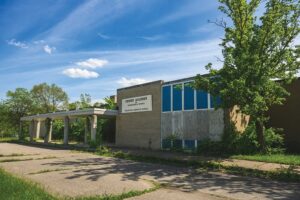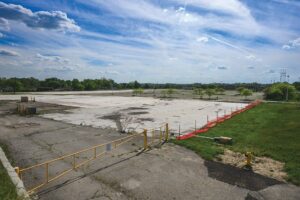Jun 05, 2024
Dynamic changes in southeast Michigan have always been part of the economic terrain. As the region’s workforces shift between industrial and agricultural industries, the region’s residential patterns transform as well, mirroring the changing needs for rural and urban population centers. This is especially evident in Washtenaw County, straddling the border between the industrial center of Detroit and Wayne County, and the more agriculture-intensive counties elsewhere in Michigan. This is especially evident in Washtenaw County, straddling the border between the industrial center of Detroit and Wayne County, and the more agriculture-intensive counties elsewhere in Michigan.
With a population of 372,000 in the 2020 census, Washtenaw encompasses major city centers like Ann Arbor and Ypsilanti — both home to world-class academic institutions — and a proud farming community in outlying townships with a rich history of agricultural innovation of their own. Working together, county leaders have harnessed data-driven, nimble and responsive tools to make sure Washtenaw is at the forefront of creative community planning.
“We really want to make sure that entrepreneurship and business opportunities are here, and that we illuminate them in the right way.”
– Gregory Dill, Washtenaw County Administrator
Doing so has helped drive new solutions for age-old problems like housing and healthcare inequality, infrastructure aging and resource management for the 21st century.
One innovative tool under the belt of county leaders is the Opportunity Index. The Opportunity Index (www.opportunitywashtenaw.org) is a benchmarking tool that identifies where there is — and, importantly, is not — access to opportunities in health, financial and career services. The index maps with pinpoint accuracy where residents in Washtenaw have more or fewer opportunities in each of these sectors.
“We look at access to job opportunities, access to food, health outcomes, life expectancy, and more,” says Justin Hodge, Washtenaw County Commissioner for District 5 and Chair of the Board. “We can see where there are [geographic] areas where people tend to have lower access to opportunity, and so we strategically make greater investments there.”
At the county level, administrators and planners are committed to using data tools like the Opportunity Index to shape public policy and funding streams. Policy and program decisions are based on the index.
Washtenaw County Administrator Gregory Dill sees the Opportunity Index as a vital information source to guide his work. At the end of the day, he says, “we are the safety net in our community. And we want it to be positioned well to do that work.”

All in for all members of the community
“The core of what we’ve been trying to achieve is to ensure equity for everyone,” says Commissioner Hodge. “We want the community to be a place where everybody has the opportunity to thrive and be successful.” Across Washtenaw County, from Hodge’s eastern district, which includes the city of Ypsilanti, to the rural outer rings like Manchester and Bridgewater Townships, leaders are working directly within the community to level the playing field for all. “We’re really trying to shift, generationally, the outcomes for people in Washtenaw County,” Hodge says.
Recreation as Attraction
Washtenaw County is attracting national attention for its commitment to providing enriching recreational opportunities for residents and visitors across the county. The Eastern Washtenaw Community Recreation Center is a $30 million project on the 26-acre site of the former Cheney Elementary School on the border of Superior and Ypsilanti Townships.
But the project is more than a mere recreation center, says Washtenaw County Administrator Gregory Dill. With funding from local, county, state and federal governments, he says, the site will act as “the town square of that community” with spaces dedicated to childcare and healthcare. The center, he says, “will act as a conduit to make sure that those lowest on the [poverty] index don’t have to travel to receive services.” With these additions, he says, “we have a huge opportunity to interrupt generational poverty.”
 Another recreational development making waves in Washtenaw County is a collaboration between Destination Ann Arbor, Marriott Eagle Crest, Ypsilanti Charter Township and Eastern Michigan University. The Rowing Course at Ford Lake is a submersible, championship-level rowing course that will emerge from below the surface during competitions. The course is capable of hosting regional, national and international rowing events, and it will prime the area to become a destination for rowing professionals and enthusiasts from around the globe.
Another recreational development making waves in Washtenaw County is a collaboration between Destination Ann Arbor, Marriott Eagle Crest, Ypsilanti Charter Township and Eastern Michigan University. The Rowing Course at Ford Lake is a submersible, championship-level rowing course that will emerge from below the surface during competitions. The course is capable of hosting regional, national and international rowing events, and it will prime the area to become a destination for rowing professionals and enthusiasts from around the globe.
By examining how infrastructure issues like Internet access can negatively impact residents, Washtenaw County leaders have nearly completed an ambitious initiative to provide broadband internet access to every residence in the county, linking up rural and high-density addresses alike. This helps every resident, from the senior citizen meeting with their doctor via a telehealth appointment or an elementary student accessing online tutoring software.
Financial empowerment programs are another tool that county leaders implement for long-term prosperity. The My Future Fund is a county-wide children’s savings initiative, in which each student who qualifies for free school lunches is granted a $500 college savings account. The Financial Empowerment Center offers one-on-one counseling for residents in a number of financial topics.One ultra-responsive and local strategy that the county directs to help eradicate income inequality is the Mobile Service Support Initiative (MSSI), a “community center on wheels” that uses data tools like the Opportunity Index, the Social Vulnerability Index and qualified census tracts to pinpoint where in the community its services are most needed at any given time.
Like many communities, Washtenaw County faces plenty of housing challenges. According to the Washtenaw Urban County 2023-2027 Consolidation Plan, the most common problem facing both renters and owners in the county is cost burden. Dill and the county commissioners have taken a nimble approach to housing woes and are building vibrant and connected communities in the process. The goal, says Dill, is to “create a place where all housing sectors can thrive.”
That means turning blighted or abandoned spaces into mixed-use and mixed-income properties that draw residents from all ends of the housing spectrum. One such project is the Dorsey Estates Brownfield redevelopment on the east side of Washtenaw County.When completed, it will feature 46 mixed-income residential condominiums. A mixture of cottages, duplexes and townhomes, half of the Dorsey Estates will be available for residents with income targeting between 40% and 80% of Area Median Income (AMI) as defined by the United States Department of Housing and Urban Development (HUD).
Christopher Girdwood is the CEO of Detroit Region Aerotropolis, a public-private economic development partnership that drives investment around Detroit Metropolitan and Willow Run airports and the I-94 corridor. He’s worked closely with Washtenaw County on this and other projects and has high praise for their outside-the-box approach. “Dill and Commissioner Hodge have taken a renewed focus to look at brownfield sites and how they may be located in underserved communities and how there could be a win-win,” he says. “Remediating the brownfield site and bringing new investment to an underserved community is very much a focus from a real estate perspective.”
Another adaptive reuse project in the works for the county is repurposing valuable land at Briarwood Mall, located just off I-94 and State Street. County leaders are working with developers to tear down the vacant Sears and replace it with a four-story, 354-apartment building alongside a two-story commercial building with an anchor grocery store. And on the western edge of the county, a 100-year-old stove manufacturing factory will be transformed into market-rate apartments thanks to a $1.5 million grant from the Michigan Community Revitalization Program.
Re-use and Renewal
Developers and officials in Washtenaw County are seeking ways to transform once blighted sites. Here are a few highlights. Photos by Doug Coombe for Crain’s Content Studio.
 |
 |
 |
Detroit Region Aerotropolis: Power of Partnership
A formerly blighted and abandoned shopping center is now ready for redevelopment in Ypsilanti Township. After decades of gradual decline ever since the closure of a nearby freeway ramp, township and county officials are eager to work with planners from Wayne County just across the county line. Wayne and Washtenaw Counties are set to renew a joint operating agreement, says Washtenaw County Administrator Gregory Dill, and Gault Village may be a perfect spot to develop a site that benefits residents of both communities that want better access to food and shelter.
The joint operating agreement, says Dill, “really set the table for us to have more generative discussions with Wayne County about how we develop this corridor.” Justin Hodge, WashtenawCounty Commissioner for District 5, agrees. His district straddles the border between Washtenaw and Wayne Counties. “Residents don’t care about which jurisdiction is which,” he says. That’s why he worked so closely with Christopher Girdwood, CEO of Aerotropolis, on the Gault Village project, which directly benefits residents of both counties. “Housing, homelessness or the need to buy food, or any other need, is not bound by jurisdiction, so partnership is essential,” Hodge says.
Girdwood agrees. “Being a part of Aerotropolis is something that allows me to understand the Wayne County and Washtenaw County partnerships much better. Aerotropolis gives Washtenaw a small pathway to collaborate with Oakland, Macomb and Wayne County. We’re happy to help them increase that collaboration.”
Reinforcing the Talent Pipeline
By shoring up infrastructure and creating equitable and desirable housing from underutilized sites, Washtenaw County leaders are betting on a promising future for the county. The county has an active farming community, with a farm council that supports farmers and their families’ social and financial needs, and a Michigan State University Extension program that caters to the unique needs of the county’s many rural residents.
That’s one of many strengths that help position Washtenaw for economic development, says Administrator Dill. “What our infrastructure is perfectly situated to do,” he says, “is just that blend between the urban and the rural parts of our communities. When you think about east and west on I-94 and north and south on US-23, we have the conduit and the framework to build that connection between our urban and rural areas.”
Part of that conduit is a robust school system, from preschool all the way through the county’s world-class universities. “We always talk — rightfully so — about the University of Michigan,” says Dill. “But our public schools are among the top in the state of Michigan, and we have Eastern Michigan University, another leader in education.”Attracting and retaining top talent to Washtenaw is made easier with partnerships like Ann Arbor SPARK, a community resource that helps drive economic growth by offering startup services, business expansion assistance, and funding solutions for new and established businesses in Washtenaw. Those partnerships paid off in June 2023 when Toyota North chose York Township for its next expansion, a project expected to bring nearly $50 million in capital.
At the same time, Toyota doubled down on its interest in Washtenaw by announcing its first “Driving Possibilities” STEM initiative to create Pre-K-12 opportunities to prepare today’s youth for tomorrow’s job opportunities.
Public-private partnerships in funding, training, housing and more, say Washtenaw County leaders, are the key to positioning Washtenaw County to reap its best economic rewards. To make sure that “our talent will want to stay in this community,” says Administrator Dill, “we really want to make sure that entrepreneurship and business opportunities are here, and that we illuminate them in the right way.
By Mickey Lyons, Crain’s Content Studio – Opportunity Washtenaw: County officials fuel growth in urban and rural areas with data-driven tools and strategic plans | Crain’s Detroit Business


